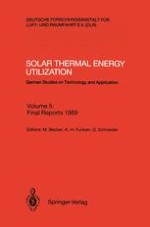1991 | OriginalPaper | Buchkapitel
Thermochemical H 2- Production with Sulfur-Iodine Process and Solar Energy Adaptation
verfasst von : K. F. Knoche
Erschienen in: Solar Thermal Energy Utilization
Verlag: Springer Berlin Heidelberg
Enthalten in: Professional Book Archive
Aktivieren Sie unsere intelligente Suche, um passende Fachinhalte oder Patente zu finden.
Wählen Sie Textabschnitte aus um mit Künstlicher Intelligenz passenden Patente zu finden. powered by
Markieren Sie Textabschnitte, um KI-gestützt weitere passende Inhalte zu finden. powered by
A thermochemical cycle for hydrogen production is a process in which water is used as a feedstock along with a non-fossil high temperature heat source to produce H2 and O2 as product gases. The water splitting process is accomplished through a closed loop sequence of chemical reaction steps in which the chemical reagents are continuously recycled and reused in the process with essentially no loss of material. Practical thermochemical cycles, as currently envisioned, require input temperatures of 1200K for the highest temperature chemical step, and operate at a thermal efficiency of about 50%. Here, the thermal efficiency is defined as the higher heating value of the H2 produced divided by thermal heat per mole of H2 delivered by the high temperature heat source. High temperature gas-cooled reactors have been considered as heat source for these cycles. Electrical energy for process equipment is required in addition to high temperature heat for operation of thermochemical hydrogen plants.
